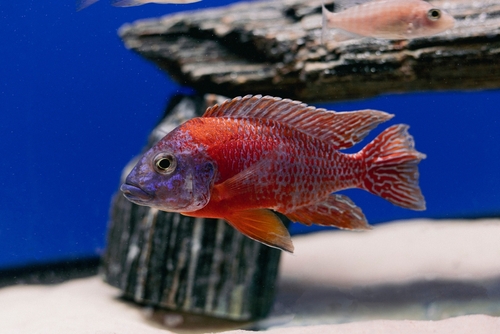Your new peacock cichlid is your pride and joy- but your aquarium looks a little empty. What are the best peacock cichlid tank mates?
The best peacock cichlid tank mates are other cichlids such as the azureus and star sapphire. Plecos and synodontis catfish are also great tank mates. Try to find a tank mate with similar requirements and a non-aggressive personality.
If you’re looking for the 15 best peacock cichlid tank mates, you’ve come to the right place. So let’s dive right in!
Contents
Peacock Cichlid Tank Mates- What You Need To Know
Temperament
Unlike other cichlids, peacocks are pretty laid-back. You will want to purchase other laid-back fish to co-inhabit.
Size
You need to purchase fish that are similar in size to peacock cichlids.
Male peacock cichlids average around 6 inches in length. Females usually are as long as 4 inches.
Competition
All fish are fairly competitive. The best way to combat competitiveness among peacock cichlids and tank mates is by sticking to a 1:4 ratio- one male to every four females.
You can opt for an all-female tank for a more peaceful atmosphere if you are not planning on breeding them.
Having an all-male tank will work, too, since there will be no females for them to fight over.
Also, avoid similarly colored fish, as this will provoke aggression.
Parameters ; Tank Setup
You need a tank with plenty of space to swim for peacock cichlids. The bigger the tank, the less crowded it will be for the fish- which also removes some agitation. Opt for a wider setup rather than a taller one when setting up your tank.
Peacock cichlids require warmer tanks with lots of rocks and vegetation at the bottom. Decorations and greenery allow each fish to have places with physical boundaries. As they say- good fences make good neighbors.
15 Best Peacock Cichlid Tank Mates
Other posts you might like:
1. Azureus Cichlid
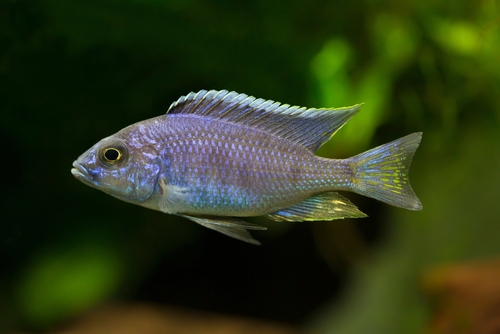
- Scientific Name: Copadichromis azureus
- Adult Size: Males- 7 inches, females- 5 inches
- Compatible with: Peacock cichlid, plecos, haplochromis, and cuckoo catfish.
- Water temperature: 78° to 82° degrees Fahrenheit
- Minimum Tank Size: 50 gal
- Care Level: Intermediate
These fish are pretty laid back- but you should be wary of overly dominant males. They are also sexually dimorphic, making it easy to tell which is a male and female, which is great for trying to create a peaceful tank atmosphere.
PROS
- They are peaceful fish.
CONS
- The males can get territorial, showcasing signs of mild aggression at times.
2. Clown Plecos
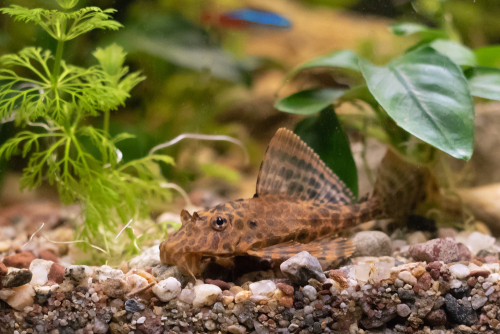
- Scientific Name: Panaque maccus
- Adult Size: 3 ½ inches
- Compatible with: Ember tetra, peacock cichlids, cory catfish, and minnows.
- Water temperature: 74° to 80° F
- Minimum Tank Size: 20 gal
- Care Level: Easy
Clown plecos are smaller, peaceful fish. They are at their happiest when doing their own thing and will ignore other fish most of the time. This attitude makes them great tank mates for the also mostly mellow peacock cichlid.
Pairing this fish with any larger than a peacock cichlid is not recommended.
PROS
- Low-maintenance
- Gets along well with others
CONS
- They will need a significant amount of driftwood for their diet.
3. More Peacock Cichlids
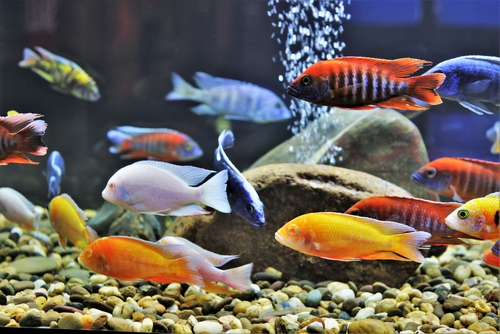
- Scientific Name: Aulonocara
- Adult Size: Males- 6 inches, females- 4 inches
- Compatible with: Plecos, botia loaches, red-tail sharks, and more.
- Water temperature: 76 to 82° F
- Minimum Tank Size: 55 gal
- Care Level: Easy
Sometimes more peacock cichlids in your tank can be great. They get along fairly well with each other as long as there are about four females to every male.
PROS
- You already have some in your tank
CONS
- You will need plenty of females, or only stick to having one sex
4. Chrysonotus White Blaze
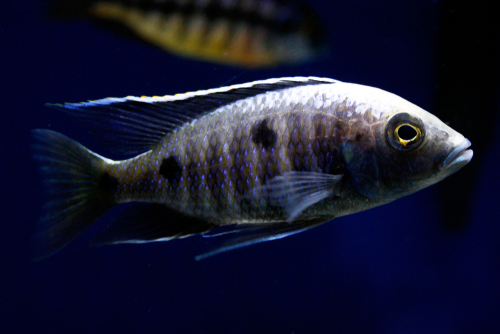
- Scientific Name: Copadichromis chrysonotus
- Adult Size: 7 inches
- Compatible with: Malawi peacocks, victorian haps, Malawi haps
- Water temperature: around 74 to 82° F
- Minimum Tank Size: 55 gal
- Care Level: Easy
Since these are open-water fish, they do best in larger tanks, similar to the peacock. They are shoaling fish by nature, meaning they prefer not to be alone and do well with similarly peaceful tank mates.
They tend to be picky eaters, but the ones raised in captivity are less picky.
PROS
- Very peaceful
CONS
- Can have a fussy diet sometimes
5. Star Sapphire Cichlid
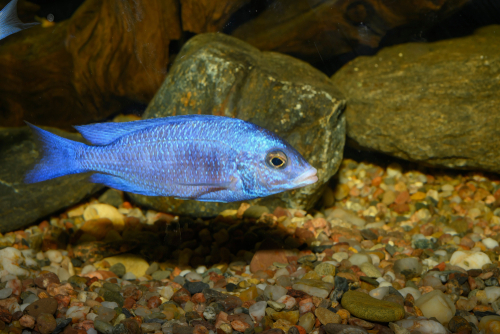
- Scientific Name: Placidochromis Phenochilus
- Adult Size: Male- 10 inches, female- 6 inches
- Compatible with: Peacocks, haps, and synodontis
- Water temperature: 74 to 82° F
- Minimum Tank Size: 75 gal
- Care Level: Moderate
The Star Sapphire Cichlid’s dazzling blue appearance is highly sought after in the home aquarium world and looks great alongside the peacock cichlid.
PROS
- They are quiet and peaceful fish
CONS
- They are a little larger than the peacock, which could intimidate some territorial peacock males
6. Placidochromis Electra
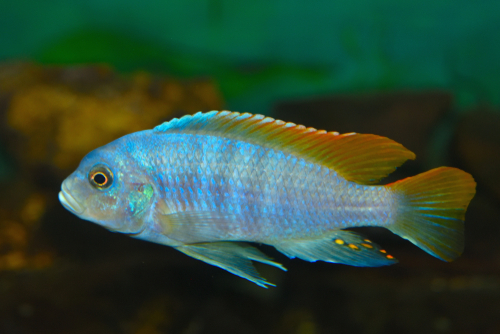
- Scientific Name: Placidochromis Electra
- Adult Size: 8 inches or less.
- Compatible with: peacock cichlids, star sapphire cichlid, and others from the Malawi community.
- Water temperature: 75° to 79°F
- Minimum Tank Size: 50 gal
- Care Level: Easy
The placidochromis electra, sometimes called the deepwater Hap, is another undemanding species that mixes well with the peacock cichlid. Because of their gentle nature, they tend to get along well with similar fish.
PROS
- Very gentle species
CONS
- Can become territorial while breeding
7. Placidochromis Johnstoni
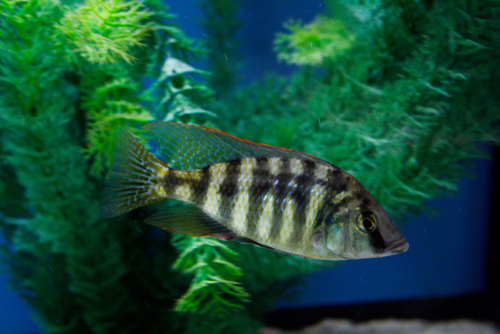
- Scientific Name: Placidochromis johnstoni
- Adult Size: 8 inches or less.
- Compatible with: Peacock cichlids, haps, and star sapphire cichlids.
- Water temperature: 74 to 82° F
- Minimum Tank Size: 50 gal
- Care Level: Moderate
Like the peacock, this species prefers plenty of vegetation in its tank. These fish typically stick in groups, but they do well alone too. You’ll find them hanging out at the bottom of the tank since they prefer shallower waters.
PROS
- Likes to stick to the bottom
CONS
- They tend to be more aggressive
8. Botia Loaches
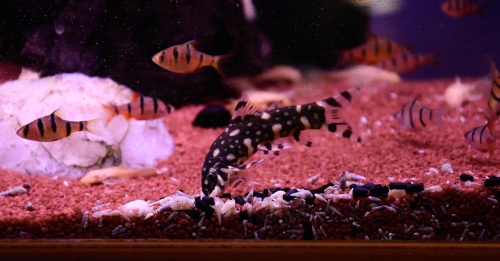
- Scientific Name: Botia lohachata
- Adult Size: 6 inches or less
- Compatible with: Barbs, danios, and peacocks.
- Water temperature: 72° to 86°F
- Minimum Tank Size: 50 gal
- Care Level: Intermediate
Botia loaches get along fairly well with most freshwater fish. However, to make them comfortable, you should have your tank well established for a few months before placing them inside.
PROS
- Likes to be in groups
CONS
- Tend toward aggression
9. Haplochromis Flameback Cichlids
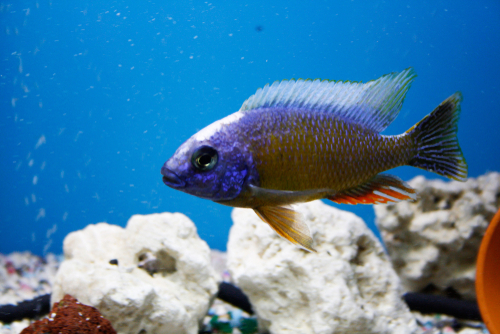
- Scientific Name: Haplochromis
- Adult Size: 4 to 4 ½ inches
- Compatible with: All Malawi and Victorian haps and cichlids.
- Water temperature: 76° to 82°F
- Minimum Tank Size: 50 gal
- Care Level: Easy
The haplochromis is one of the biggest groups of cichlids in the family. They are also some of the most colorful beauties of the fish world! They’re great, peaceful companions for the peacock cichlid- but make sure you get the right one, such as the flameback cichlid.
PROS
- They are a peaceful variety of haplochromis
CONS
- It needs other non-aggressive fish in the tank with it
10. Red Tail Shark
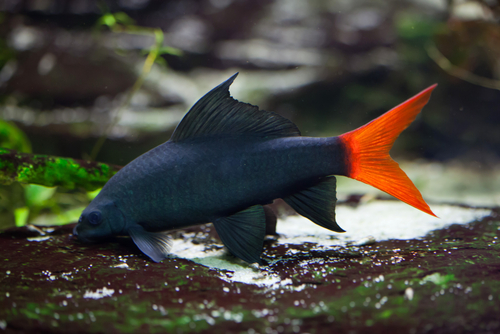
- Scientific Name: Epalzeorhynchos bicolor
- Adult Size: 6 inches or less
- Compatible with: Barbs, mollies, and peacock cichlids.
- Water temperature: 72° to 79° F
- Minimum Tank Size: 55 gal
- Care Level: Intermediate
Red-tail sharks are more on the aggressive side. However, pairing them with multiple peacock cichlids will help prevent aggressive tendencies!
PROS
- Like the peacock cichlid, it prefers larger tanks
CONS
- Nocturnal
- Aggressive
11. Electric Blue Ahli
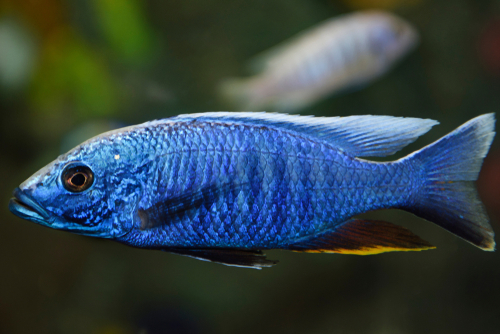
- Scientific Name: Sciaenochromis Ahli
- Adult Size: 7 inches
- Compatible with: Haplochromis, peacock cichlids, and synodontis catfish.
- Water temperature: 73° to 82° F
- Minimum Tank Size: 90 gal
- Care Level: Intermediate
The electric blue Ahli thrives in large tanks with lots of swimming room. Since these fish come from the same environment as the peacock cichlid, they love having rocky tank bottoms.
PROS
- It has the same environmental needs as the peacock cichlid
CONS
- Aggressive towards fish of similar color
12. Synodontis Catfish
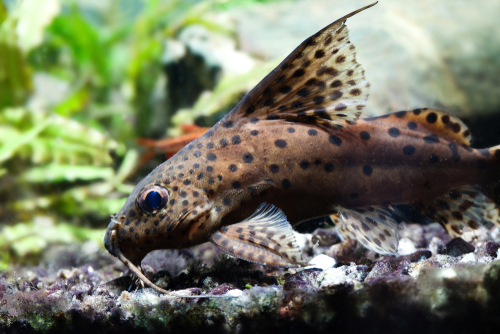
- Scientific Name: Synodontis
- Adult Size: 8 inches or less
- Compatible with: Haplochromis, peacock cichlids, and other synodontis catfish.
- Water temperature: 72° to 82° F
- Minimum Tank Size: 20 gal
- Care Level: Easy
These great fish are adaptable and easy to take care of, making them a great addition to your peacock cichlid tank! They will be a little shy at first. Supply adequate hiding places while they warm up to their new home.
PROS
- Adaptable
- Easy to care for
CONS
- Needs to be in groups
13. African Red Eye Tetra
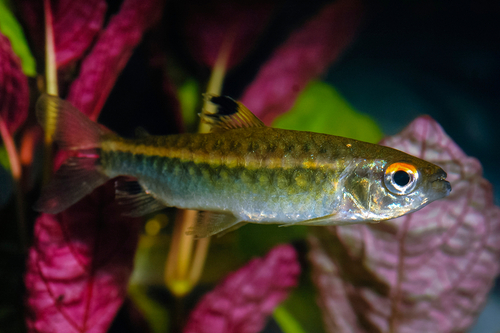
- Scientific Name: Arnoldichthys spilopterus
- Adult Size: 4 inches or less
- Compatible with: Peacock cichlid and synodontis.
- Water temperature: 73° to 82° F
- Minimum Tank Size: 50 gal
- Care Level: Easy
The African red eye tetra is an active but peaceful species. Their startling red eyes are easy to spot inside a large tank, making them eye-catching fish!
PROS
- Peaceful
CONS
- Needs to be in groups
14. Giant Danios
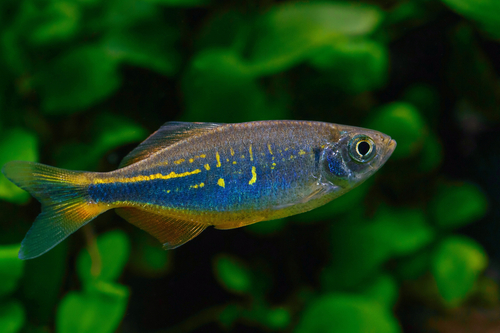
- Scientific Name: Devario aequipinnatus
- Adult Size: 6 inches or less
- Compatible with: Many cichlids, tiger barbs, and cory catfish.
- Water temperature: 72° to 75°F
- Minimum Tank Size: 30 gal
- Care Level: Easy
Giant danios are great tank mates with peacock cichlids because they are similar in size. These fish are more energetic and will need plenty of room to swim. A giant danio will be a great addition if your tank is big enough.
PROS
- Similar in size to peacock cichlid
CONS
- A little more energetic
- Prone to bullying
15. Rainbow Shark
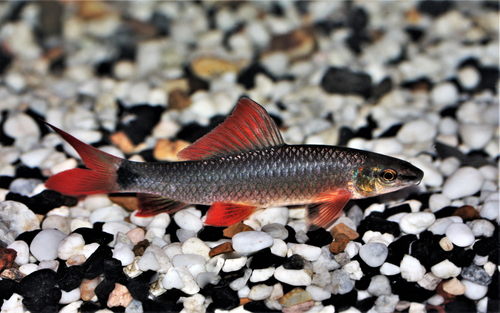
- Scientific Name: Epalzeorhynchos frenatum
- Adult Size: 6 inches or less
- Compatible with: Plecos, barbs, danios, loaches, and peacock cichlid.
- Water temperature: 72° to 79°F
- Minimum Tank Size: 50 gal
- Care Level: Intermediate
Rainbow sharks thrive with larger tanks, making them great tank mates with the passive peacock cichlids, who also require more room to swim.
PROS
- They are very pretty
- Need the same amount of space as peacocks
CONS
- Very aggressive
Summary
The peacock cichlid is a fairly laid-back species of fish. As such, they get along great with similar fish. When looking for peacock cichlid tank mates, consider species from Malawi, like the star sapphire and the flame back. Loaches and synodontis catfish also do great with the more docile cichlid!
Frequently Asked Questions
Can you keep peacock cichlids with other fish?
Since peacock cichlids are tame members of the cichlid family, they do great with non-aggressive fish as tank mates. The male of the species can sometimes become territorial, but these attitudes disappear if the tank is large enough and has plenty of hiding places.
What do peacock cichlids like in their tank?
Peacock cichlids need ample space to swim around. In the tank, they love having rock formations and vegetation to swim through and hide in. These decorations help them to set up territories.
Can peacock cichlids live in a community tank?
Peacock cichlids can live in a tank with as many other fish as the aquarium will support. However, when setting up a community tank, it is best to have at least two females per male- more is preferred if you can.

Ian Sterling, founder of Fishlab.com, began his aquarium journey over 30 years ago, driven by a deep fascination for fish and their diverse personalities. His website, Fishlab.com, is dedicated to making fishkeeping accessible and enjoyable, offering beginner-friendly guidance, expert insights, and a community for aquarists to connect and share experiences.


